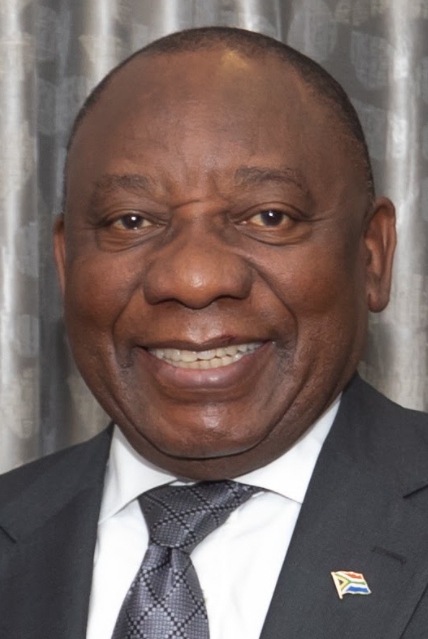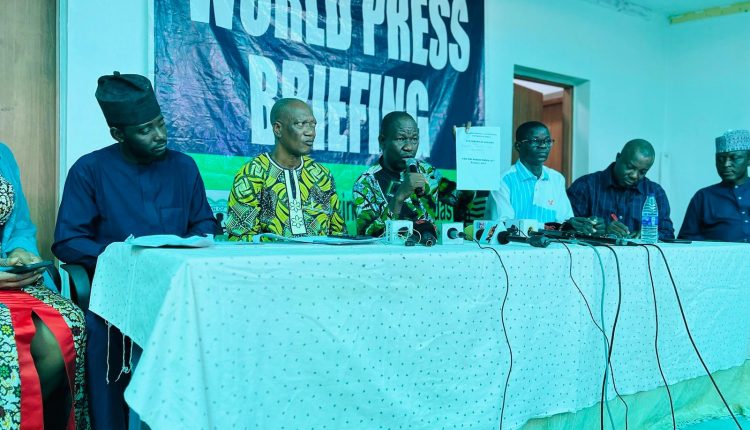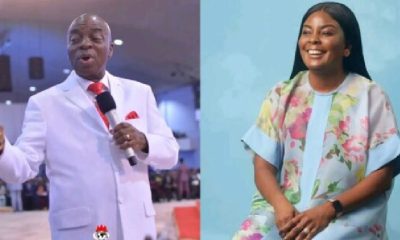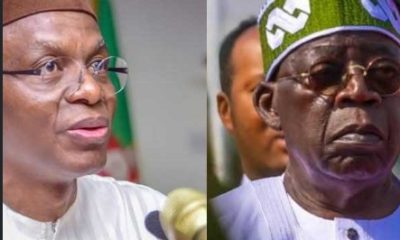News
SOUTH AFRICAN ELECTIONS AND LESSONS FOR NIGERIAN POLITICS

BY BOLAJI AFOLABI
That Nigeria and South Africa have a long history of intertwined political and economic relationship is undisputable. That Nigeria played strategic and frontal role in the emancipation of the black-dominated country is real and true. That Nigeria was the arrow-head in the country’s long years of apartheid struggles and subsequent independence can not, never be obliterated. One recalls with nostalgia the humongous human, capital resources as well as the quantum, qualitative logistics and capacity building Nigeria contributed to the “rainbow country” and its nationals. For various lengths of time, leaders and citizens of South Africa including revered Bishop Desmond Tutu and former President Thabo Mbeki were residents of major cities in Nigeria at the expense of the Nigerian government. Back then, South Africans schooled at first generation Nigerian universities, notably those in Ibadan, Lagos and Zaria. Their younger countrymen were accommodated in our secondary schools and privileged the best of welcomes.
After the eventual liberation of South Africa, the body language of the rainbow country has tended to suggest ingratitude for Nigeria’s sweaty exertions and disrespect for our citizens. Xenophobic assaults targeted towards Nigerians in South Africa for example, are well documented. Same is the intentional frustration of Nigerians desirous of investing in the South African economy. Yet the story of South Africa cannot and can never be complete without glowing and golden references to Nigeria’s commanding support. Every caustic denunciation vis-a-vis scant and scarce admission of Nigeria’s historic role in the South African trajectory, is a dubious attempt to distort history.
South Africa in 1994, had a foretaste of civilian governance after the dismantling of several decades of colonial rule. The country operates a unitary parliamentary democratic system where the president serves both as Head of State, and Head of Government. Since 1994, the African National Congress, (ANC) has being in power, forming government at the centre courtesy of winning overwhelming majority seats at the National Assembly and Provincial Assembly elections. The ANC in succession has produced the past and present leaderships of the country. From the iconic Nelson Mandela, to the humility-personified Thabo Mbeki, the charismatic but controversial Jacob Zuma, and the incumbent Cyril Ramaphosa, the party has enjoyed near-total grip and control of governance for 30 years.
Many Nigerians recall May 29 as the birth date of Nigeria’s fourth republic. South Africans enthusiastically looked forward to the date as they voted new parliamentarians. More than 27 million citizens took part in the 2024 elections into the national and provincial legislatures as prelude towards electing the president of South Africa. Such a president will hold office for five years as provided for by the South African Constitution. To produce the president, a political party must win not just majority seats at the national assembly elections BUT meet or surpass the threshold of 201 out of the 400 seats in the parliament. The ANC, since 1994 had always met this criteria. For instance, in the last two elections in 2019 and 2014, the party won 230 and 249 seats respectively.
As the build-up to the 2024 elections began, there was a unanimity of opinion that the election will be different. There was general consensus that the ANC, under Ramaphosa has not met the yearnings and expectations of nationals. Like in Nigeria, many people alluded to alleged rising cases of poverty; disabling unemployment; pervading insecurity; incongruous corruption; unbridled insensitivity and systemic impunity. Vast majority of people concluded that the elections, unlike before would not be smooth-sailing for the ANC which in previous polls gallops to resounding victories.
As a student of political history, and chronicler of democratic development across the continent, the writer for several months devoted close attention to political developments in South Africa. Aside voraciously reading news and political events online, one devoted about three hours daily watching and monitoring news and political programmes on television stations in South Africa including the behemoth South African Broadcasting Corporation, (SABC), NewzRoom Afrika. Campaigns by all the major political parties were issue-based, intensive, and extensive. Unlike what happens in Nigeria, listening to respective parties leaders and members in the build up to the polls, one had explicit, concrete, almost graphic ideas about what each party stands for. Given the unpredictability of the elections, Ramaphosa; even as president was on the streets, combing nooks and crannies of South Africa soliciting for votes. The leadership and members of the other major and even minor parties did same.
Fact is, South Africa is ahead of Nigeria in political engineering, party politics, quest for political power, and national development. At every discourse, deliberations, and analysis by party faithful and apolitical citizens you notice sincere, objective, informed, and frank contributions. With no fear, apprehension of violent attacks by opponents, political parties engage in constructive criticisms by offering concrete alternatives on every issue. To a large extent, freedom of speech, expression of opinions, and canvassing different positions remains visible. To be sure, the SABC, a government-owned media organisation on May 28, a day before general elections made frank, courageous, and bold predictions that appeared not to favour the ruling party. In an audacious manner, the station, at one of its programmes projected that elections would be keenly contested; forecast the spread of votes and seats to be won, among others. Similarly, some analysts, commentators, and academics projected that the ANC was not likely to meet the threshold.
Sunday June 2nd, exactly four days after the 2024 general elections, history was made, records were broken. The country’s Independent Electoral Commission’s, (IEC) chairperson, Mosotho Moepya in his state-wide speech described it as “the most difficult and most keenly contested elections since the end of apartheid in 1994.” Contrary to the position of Zuma, MK party, and few other parties, Moepya declared the election as “free and fair.” Announcing results, Moepya said 18 political parties won seats into the National Assembly, including the major ones; African National Congress, (ANC) 159; Democratic Alliance, (DA) 87; uMKhonto weSizwe, (MK) 58; Economic Freedom Fighters, (EFF) 39; Inkatha Freedom Party, (IFP) 17; Patriotic Alliance, (PA) 9.
By the results, the pre-election prognosis, and projections by the SABC, opposition parties, informed minds, and many nationals, the ANC, for the first time since 1994 though won majority seats but failed to meet the threshold of 201. Having won 159 seats, 41 short of the magical number the party under Ramaphosa failed to maintain the ANC’s 30-year old unbroken dominance of the National Assembly. That ANC’s unchallenged grip of the parliament was finally broken did not come as surprise to many people, including opposition leaders and commentators. With the preponderance of economic challenges, lawless profligacy, socio-political statis, and growing disenchantment of the citizenry, and ANC’s unencouraging and unenthusiastic measures in positively changing the negative trend, many people foretold results of the general elections.
In a short address laced with jokes at the IEC’s results-declaration event, Ramaphosa agreed that “the results represents a victory for democracy, for the county’s constitutional order, and for all the people of South Africa.” As it is, the ANC will have to assemble a coalition with some parties, in the national assembly to form the next government. This must be done in over ten days when the national assembly will hold its first sitting and elect the country’s president for the next five years. This difficult situation it found itself would not have arisen but for the political disagreement that led to exit of Zuma from the ANC. That the Zuma-led MK party formed late 2023 was able to, in barely six months won 58 seats and finished third ahead of Julius Malema’s EFP exposed Ramaphosa’s inability to manage the crisis.
Also, it confirms Zuma’s credentials as a grassroot mobiliser, and strong political personality as demonstrated through his huge campaigns, reasonable followership, and encouraging results at the polls. Similarly, the performances of the major opposition parties which shows that party politics is growing in the country should be of serious concerns to the hegemony of the ANC. One strong discovery is the passion and commitment exhibited by “white South Africans” in this election. One can safely project that if sustained, one of them may emerge president in the not-too distant future even if “local South Africans” populate the national assembly.
While opposition parties in South Africa are clearly waxing stronger, the reverse is the case in Nigeria. The results of elections in the rainbow country is serious wake up call to the political elite in Nigeria. Unlike here where politicians break into smithereens, going back and forth, and around parties, the reverse is the case in South Africa. Through thick and tin, rain and sun members stay committed to their party’s ideologies and manifesto. Unless and until opposition parties wean themselves off inordinate ambition, selfishness, “i-myself-alone” mindset, narrow-minded perception, and selfish tendencies they cannot make headway in general elections. Sadly, with the next election few years away, any discerning and dispassionate mind can notice these challenges playing-up already. To dislodge the APC in 2027, opposition parties and leaders must consciously and deliberately shrug off these negatives and put the nation first. How they wriggle themselves out of these self-induced quagmire is left to be seen; can they do it? Time Will Tell!!
*Bolaji Afolabi, a Development Communications specialist was with the Pubic Affairs Office in The Presidency, Abuja.*
News
NUJ-FCT Unmasks Financial Scandal Under Ex-Leadership, Issues Disclaimer

…handover Ogbeche, Osadebamwen, others to EFCC for probe
Speaking during a media interaction in Abuja, the Council under the leadership of Comrade Grace Ike shared details of the inquiry conducted by a committee established by the NUJ Congress. The initiative is part of ongoing efforts to enhance organisational accountability and strengthen internal governance systems.
The five-man panel, chaired by veteran journalist, Comrade Tony Akowe, included Comrade Ndubueze Chidoka (Secretary), Comrade Akin Orimolade, Comrade Princess Ekwi Ajide, and Comrade Imam Umar.
The committee’s scope covered activities from December 2018 to October 2021, encompassing the periods of past administrations led by Emmanuel Ogbeche and Patrick Osadebamwen.
According to the committee’s documentation, critical gaps were observed in record-keeping and transitional documentation. In addition, there was limited engagement from some former officeholders during the review process. The only available financial review for the period in question reportedly presented inconsistencies requiring further attention.
The committee noted that its work was hampered by a lack of cooperation from key figures of the past administration. According to Mr Akowe, no formal handover was done, and only a limited set of documents including one audited financial report and some rental receipts was made available.
Efforts to retrieve further documentation from the former chairman, Mr Patrick Osadebamwen, proved unsuccessful. He reportedly claimed to have submitted relevant documents to the NUJ National Secretariat, which has since denied receiving any such records.
The probe uncovered several questionable financial entries and unverified expenditures:
• A total of ₦33 million was declared as rental income between 2018 and 2021, but there was no breakdown showing the names of tenants or corresponding rent periods.
• The administration claimed to have received ₦7.2 million in donations yet failed to provide details or evidence of the sources.
• ₦5.28 million was spent on salaries for four to five staff, even though no single staff member earned more than ₦25,000 monthly.
• Over ₦1.7 million was reportedly spent on electricity, ₦285,000 on DStv/GOtv subscriptions, ₦78,000 on “public relations and entertainment”, and ₦1 million on transport and accommodation—all lacking adequate justification.
• A controversial line item showed ₦14 million received as rent “in advance”, with no associated documentation to validate it.
The committee’s report concluded that there was no transparency in the management of the union’s finances during the period under review.
Following the probe report, the NUJ-FCT Congress, in its sitting on 12 April 2025, adopted a series of resolutions aimed at protecting the Union’s integrity and financial stability.
The Council issued a public disclaimer against the following individuals, who have been warned to cease parading themselves as representatives of the NUJ-FCT Council:
• Mr Emmanuel Ogbeche, currently Special Adviser to the Governor of Cross River State.
• Mr Patrick Osadebamwen, immediate past Chairman and journalist with the Nigerian Tribune.
• Mr Ochiaka Ugwu, former Secretary of the Council and staff of People’s Daily.
In addition, Mrs Gloria Essien has been cautioned against representing the Council at the Nigeria Labour Congress (NLC), as she no longer holds any official position within the NUJ-FCT.
The union also called on UBA Bank to freeze the NUJ-FCT Council’s accounts still under the control of former signatories (Account Nos: 1022765326, 1014057659, and Dollar Account: 3002941904), pending a full transition to the current leadership.
Furthermore, the NUJ-FCT will:
• Publish a formal disclaimer in national dailies.
• Notify the employers of the former officials about the resolutions.
• Alert government institutions, corporate bodies, and the general public not to engage with the aforementioned individuals on behalf of the NUJ-FCT Council.
The Council’s Secretary, Mr Jide Oyekunle, who anchored the press briefing, reiterated that the probe’s findings and the resolutions reflect the collective will of the NUJ-FCT Congress and the determination to protect members’ interests.
News
Finally , Lagos Court frees Quadri, young Nigerian who stood before Obi’s convoy in viral photo

The Apapa Magistrate Court, Court 9 sitting at Orege, Ajegunle – Sikiru Adagun Courthouse, has discharged and acquitted Alabi Quadri, the young Nigerian who became a national symbol of courage during the 2023 general elections, for standing boldly in front of the convoy of then-Labour Party presidential candidate Peter Obi.
He was discharged and acquitted of conspiracy to commit felony and armed robbery.
The court held that he has no case to answer.
Quadri was brought to court on Thursday, April 17, 2025, after spending months in Kirikiri Prison, Lagos.
The Nigerian Correctional Service produced Quadri at the Apapa Magistrate Court, located at Orege, Ajegunle—Sikiru Adagun Courthouse (Court No. 9).
Quadri’s case was initially slated for a hearing on April 28, 2025.
However, human rights lawyer and activist Inibehe Effiong had revealed that both he and the Director of Public Prosecutions (DPP) requested that the date be moved forward, and the court granted the application.
Quadri gained widespread attention after a viral video showed him, a teenage boy at the time, fearlessly standing before Peter Obi’s campaign convoy—a moment many Nigerians interpreted as a symbol of youthful defiance and hope during a tense election period.
The media reported that Effiong revealed that Alabi’s recent painful descent into the Nigerian prison system was not due to any major crime but rather a result of prolonged malice and resentment harboured by some self-acclaimed ‘area boys’ (thugs) in his neighbourhood.
According to the lawyer, these individuals felt entitled to a portion of the unexpected attention and goodwill, including financial support, that Alabi received following his moment in the spotlight during the 2023 presidential campaign.
Effiong, who recently visited the Apapa Magisterial Court in Lagos alongside Alabi’s mother and legal colleagues, stated that Alabi’s journey to Kirikiri prison was not only heartbreaking but appeared to be the outcome of a vendetta fuelled by local ‘area boys’ who felt entitled to the financial support Alabi received after his viral moment.
Effiong revealed that Alabi was abducted in January near his home while returning from work by the ‘area boys’ who had been threatening him.
They allegedly took him to Amukoko Police Station (popularly known as Pako Police Station) and accused him of being involved in street fights.
However, Alabi was then arraigned before a Magistrate Court along with four other individuals, said to be complete strangers to him, on allegations of conspiracy to commit armed robbery with cutlasses.
According to the charge sheet, the alleged victims were robbed of N579,000, comprising cash and four mobile phones.
Effiong also emphasised that despite being a minor, Alabi had been detained with adults at Kirikiri since January, pending legal advice from the Lagos State Directorate of Public Prosecutions (DPP).
News
Lawmaker Slams NBA Over Rivers Crisis, Demands Return of N300m

-

 News5 hours ago
News5 hours agoBREAKING: Unknown gunmen reportedly storm Senator Natasha’s family residence
-

 News13 hours ago
News13 hours ago“How my father escaped assassination” – Bishop Oyedepo’s daughter
-

 News8 hours ago
News8 hours agoSnub story on removal of Rivers Sole Administrator, it’s FAKE-Chief Registrar
-

 News13 hours ago
News13 hours agoFG expresses sympathy for CBEX victims, urges a united effort to combat Ponzi schemes
-

 News7 hours ago
News7 hours agoSAD! Again, Alleged Herdsmen Attack Three Benue Communities
-

 News20 hours ago
News20 hours agoEl-Rufai labels Tinubu’s government ‘worst in Nigeria’s history’
-

 News14 hours ago
News14 hours agoWoman tragically lost her life after attempting to flee through glass door during alleged incident of domestic violence
-

 Politics7 hours ago
Politics7 hours agoPDP govs are jokers, can’t stop coalition train, Atiku boasts






